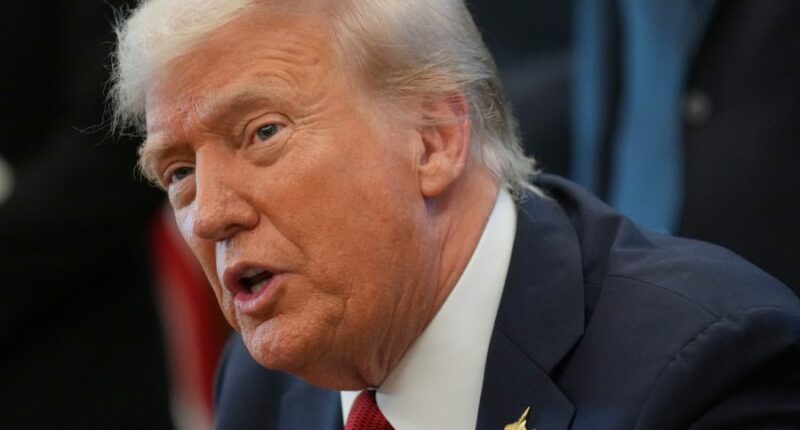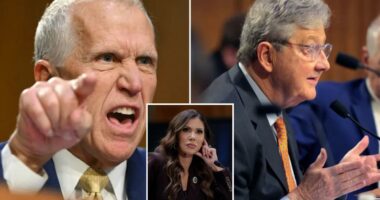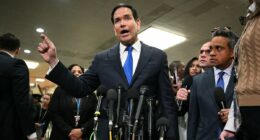Share this @internewscast.com

WASHINGTON (AP) — President Donald Trump briefly opened the door to potential discussions with Democrats on the health care subsidies at the center of the shutdown debate, only to swiftly close it on Monday, leaving both parties entrenched in a seemingly unresolvable deadlock.
Democrats are linking their support for a temporary funding bill to an extension of the health subsidies that reduce the cost of plans available under the Affordable Care Act, widely known as Obamacare.
“We have a negotiation going on right now with the Democrats that could lead to very good things,” Trump told reporters. “And I’m talking about good things with regard to health care.”
His remarks were among the few optimistic notes on Monday as the government shutdown stretched into its sixth day. Despite the strain on federal services, negotiations between the two parties have been nearly nonexistent since the shutdown commenced.
However, Trump later reiterated through his social media that the shutdown must conclude, aligning with GOP leaders in Congress. He emphasized that discussions on extending the enhanced tax credits for health insurance should occur separately.
“I am happy to work with the Democrats on their Failed Healthcare Policies, or anything else, but first they must allow our Government to re-open. In fact, they should open our Government tonight!” Trump wrote.
Before Trump walked back his remarks, the two Democratic leaders in Congress, Sen. Chuck Schumer and Rep. Hakeem Jeffries, has both denied there were any negotiations with Trump. Jeffries said the White House “has gone radio silent” since a meeting in the Oval Office last week.
“Trump’s claim isn’t true, but if he’s finally ready to work with Democrats, we’ll be at the table,” Schumer said.
Senate Majority Leader John Thune told reporters “there may be a path forward” on ACA subsidies, but stressed, “I think a lot of it would come down to where the White House lands on that.”
More doomed Senate votes
The president’s comments came as the Senate took another doomed pair of votes Monday on funding the federal government. Neither the Republican measure nor the Democratic proposal came close to gaining the 60 votes needed to advance.
Both parties used much of the day to ramp up the pressure on the other to end the impasse.
Thune said a critical food aid program for women, infants and children was starting to run low on funds, blaming Democrats and saying “now it’s the American people who are suffering the consequences.”
Schumer said his side was ready to work with Republicans to “reopen the government and end the health care crisis that faces tens of millions of Americans.”
“But it takes two sides to have a negotiation,” Schumer said.
Earlier in the day, the two sides dug in. House Speaker Mike Johnson said “there’s nothing for us to negotiate” while Jeffries declared the “time is now” to work out a deal on health care.
Johnson, R-La., told reporters they could stop asking why he wasn’t negotiating an end to the impasse. It was up to a handful of Democrats to “stop the madness” and pass a stopgap spending bill that had earlier passed the House, he said.
“We did the job to keep the government open, and now it’s on the Senate Democrats,” Johnson said.
The House is not expected to be in session this week, focusing attention on the Senate to take the lead on any deal in the Republican-led Congress. Yet even with House lawmakers away, the Republican and Democratic leaders have been holding almost daily briefings as they frame their arguments and seek to shift blame for the shutdown.
Turmoil for the economy
The stalemate comes at a moment of troubling economic uncertainty. While the U.S. economy has continued to grow this year, hiring has slowed and inflation remains elevated as the Republican president’s import taxes have created a series of disruptions for businesses and hurt confidence in his leadership. At the same time, there is a recognition that the nearly $2 trillion annual budget deficit is financially unsustainable.
The Trump administration sees the shutdown as an opening to wield greater power over the budget, with multiple officials saying they will save money as workers are furloughed by imposing permanent job cuts on thousands of government workers, a tactic that has never been used before.
Trump had seemingly suggested Sunday night that layoffs were already taking place, but White House press secretary Karoline Leavitt said Trump was talking about furloughs. Under a furlough, workers cannot report to work, but they will return to their job and get paid retroactively after the shutdown ends. She said layoffs were still planned if the shutdown continues.
The talk of layoffs has escalated an already tense situation in which Washington lawmakers have struggled to find common ground and build mutual trust. Leaders in both parties are betting that public sentiment has swung their way, putting pressure on the other side to cave.

















